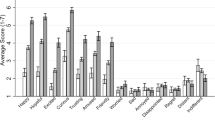Abstract
Suppose you must choose between two pieces of information A and B. In the absence of cost, you would prefer to obtain A rather than B, and in fact would be willing to take more risk to obtain A than B. Nevertheless, you would pay more money for B than for A. Are your preferences consistent with expected utility? The answer is yes; they may very well be. We give an example to illustrate how this may happen, and relate this reversal phenomenon to the well-known discrepancy between buying and selling prices for lotteries. Along the way, we demonstrate that even though selling an information source is strictly analogous to selling a lottery, buying an information source is not strictly analogous to buying a lottery. However, for any collection of lotteries there is a decision problem with corresponding information sources, each source having both buying price and selling price equal to the buying and selling prices of the corresponding lottery. The existence of preference reversals for mode of information acquisition dispels any notion that the relative value of competing information acquisitions should not depend on the nature of the acquisition. Among expected utility maximizers, only those with constant risk attitude avoid these reversals.
Similar content being viewed by others
References
Bell, David E. (1988). ''One Switch Utility Functions and a Measure of Risk,'' Management Science 34, 1416–1424.
Bernardo, J. M., and A. F. M. Smith. (1994). Bayesian Theory. New York: John Wiley and Sons.
Felli, J. C. and G. B. Hazen (1998). ''Sensitivity Analysis and the Expected Value of Perfect Information,'' Medical Decision Making 18, 95–109.
Gould, J. P. (1974). ''Risk, Stochastic Preference, and the Value of Information,'' Journal of Economic Theory pp. 64–84.
Heckerman, D. (1991). Probabilistic Similarity Networks. Cambridge, MA: MIT Press.
Hilton, R. W. (1981). ''The Determinants of Information Value: Synthesizing some General Results,'' Management Science 27 1, 57–64.
Howard, R. A. (1989). ''Risk Preference'' 1970, In The Principles and Applications of Decision Analysis, Volume II. Menlo Park CA: Strategic Decisions Group.
Howard, R. A. (1966). ''Information Value Theory,'' IEEE Transactions on Systems Science and Cybernetics SCC-2 1, 22–26.
Howard, R. A. (1967). ''Value of Information Lotteries,'' IEEE Transactions on Systems Science and Cybernetics SCC-3 1, 24–60.
Howard, R. A. (1988). ''Uncertainty about Probability: A Decision Analysis Perspective,'' Risk Analysis 8 1, 91–99.
LaValle, I. H. (1968). ''On Cash Equivalents and Information Evaluation under Uncertainty. Part I: Basic Theory,'' Journal of the American Statistical Association 63, 252–276.
LaValle, I. H. (1968). ''On Cash Equivalents and Information Evaluation in Decisions Under Uncertainty. Part II: Incremental Information Decisions,'' Journal of the American Statistical Society 63, 277–284.
LaValle, I. H. (1968). ''On Cash Equivalents and Information Evaluation in Decisions Under Uncertainty. Part III: Exchanging Partition-J for Partition-K Information,'' Journal of the American Statistical Society 63, 285–290.
LaValle, I. H. and Y. Xu. (1990). ''Information Evaluation Under Non-Additive Expected Utility,'' Journal of Risk and Uncertainty 3, 261–275.
Matheson, J. E. (1968). ''The Economic Value of Analysis and Computation,'' IEEE Transactions on Systems Science and Cybernetics SSC-4 3, 325–332.
Merkhofer, M. W. (1977). ''The Value of Information Given Decision Flexibility,'' Management Science, 23, 716–727.
Miller, A. C. (1975). ''The Value of Sequential Information,'' Management Science, 22, 1–11.
Pratt, J. W. (1964). ''Risk Aversion in the Small and in the Large,'' Econometrica 32, 122–136.
Raiffa, H. (1968). Decision Analysis: Introductory Lectures on Choices Under Uncertainty. Reading, MA: Addison-Wesley.
Rothkopf, M. H. (1971). ''A Measure of Venture Risk EVPI,'' Paper P-1990, Shell Development Co., Emeryville CA.
Wakker, P. (1988). ''Non-Expected Utility as Aversion of Information,'' Behavioral Decision Making 1, 169–175.
Author information
Authors and Affiliations
Rights and permissions
About this article
Cite this article
Hazen, G.B., Sounderpandian, J. Lottery Acquisition versus Information Acquisition: Prices and Preference Reversals. Journal of Risk and Uncertainty 18, 125–136 (1999). https://doi.org/10.1023/A:1007834413032
Issue Date:
DOI: https://doi.org/10.1023/A:1007834413032




